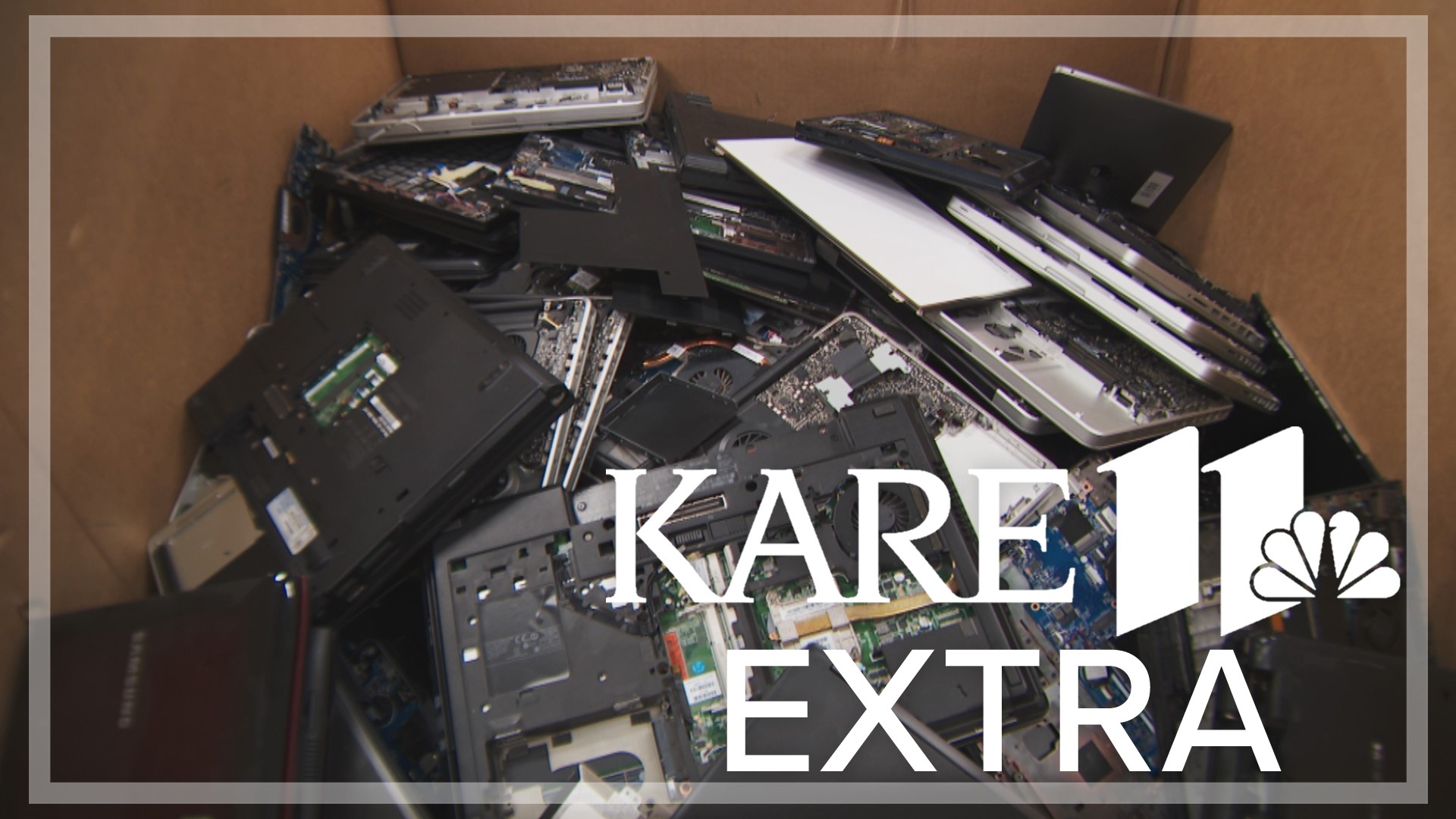ST PAUL, Minnesota — Many households have a "drawer of shame" — a place where old cell phones and other electronics are stored when they no longer get used. Or maybe there's an old TV still sitting in the basement.
Maria Jensen said even though it's better than throwing them away, all those old electronics are full of precious metals that people like Jensen are hoping to capture.
"There's metals in our electronics. Really, really valuable, high-demand metals that are in our electronics that can be recycled and reused," said Jensen, an environmental health and safety coordinator at Repowered.
The Twin Cities-based nonprofit and social enterprise (formerly known as Tech Dump and Tech Discounts) recycles and refurbishes electronics, collecting more than three million pounds of electronics every year. They also provide jobs and training to people who face barriers to employment, including people who have been incarcerated.

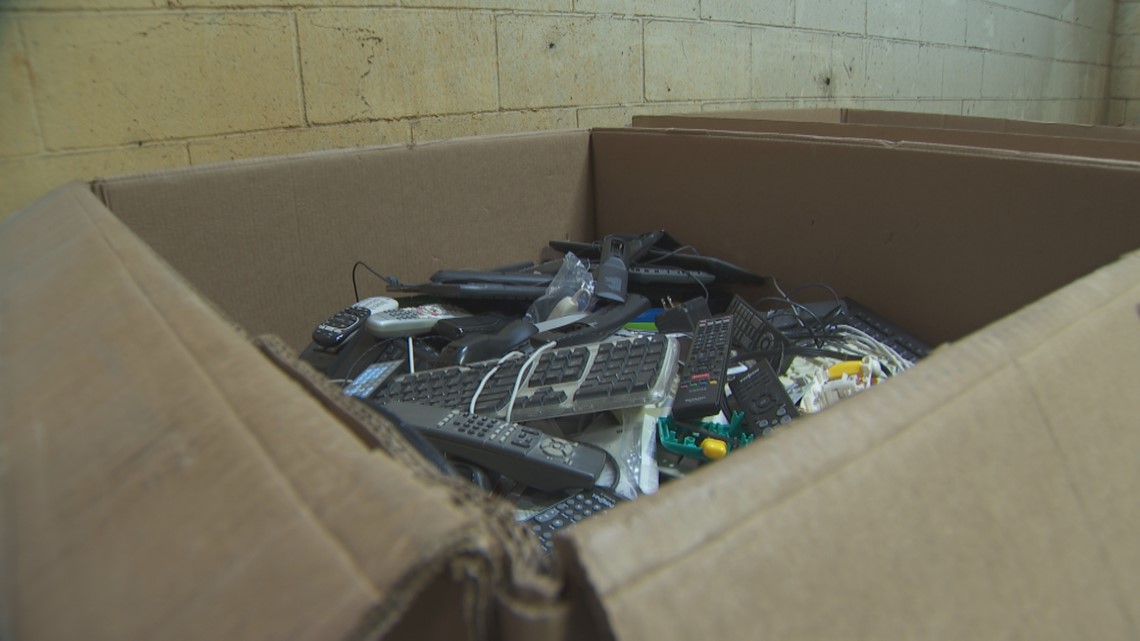
Repowered's 91,000-square-foot warehouse in St. Paul is split into sections for collecting, disassembling, sorting, shipping and refurbishing electronics.
"You can shred electronics full unit but you're going to end up with a less pure product," Jensen explained.
Repowered disassembles electronics in order to recapture as much as possible. For example, circuit boards contain precious metals including gold, silver and palladium.
"Before I got this job I had no idea about any type of electronics," said Willis Richardson, a Repowered employee. "I just used them and threw them away but now... now I know it's way bigger than that."

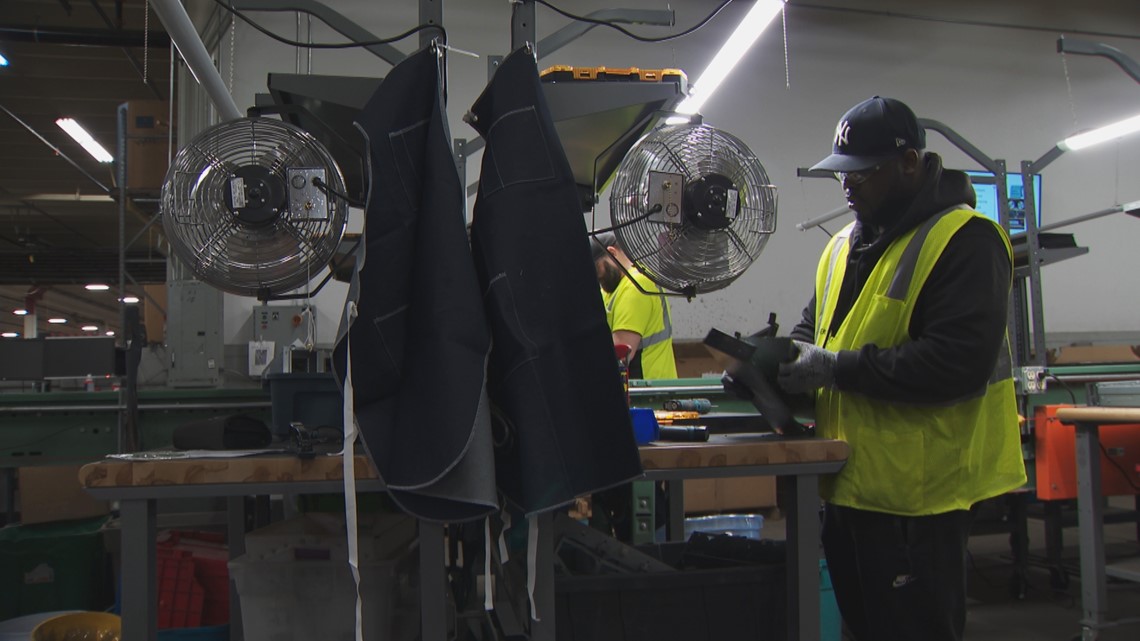
How big? Jensen and others went on a quest to find out.
Iron Range Partnership for Sustainability's Marlise Riffel and Keith Steva were interested in looking into e-waste recycling (also known as urban mining) and its potential economic impact, especially in northern Minnesota. The organization is based in Virginia, Minnesota.
"My wife and I comment that we don't want our grandchildren 30 years from now saying, 'They knew about climate change and they did nothing,'" Steva said.
Roopali Phadke, a professor of environmental policy and politics at Macalester College, connected them to Jensen.
The four of them worked on a pilot study called "The Economic Potential of E-Waste Recycling in Minnesota" and found there is $2.8 billion worth of metals in Minnesota's electronic waste stream every year.
Even though over 266 million pounds of e-waste are available for recycling in the state each year, according to the pilot study, only 23.7% of it gets captured.
"Many people will put it either in their recycling bin or in the garbage and, either way, that's problematic. Because your municipal recycling facility that takes your recycling bin at the curb, they are not equipped to handle electronics. In fact, sometimes it can be dangerous for their workers if, for example, a CRT TV ends up in their truck. It can get crushed and then that lead-laden glass can be exposed to their workers," Jensen explained. "So it's really problematic for people to put their electronics in their recycling bin and if they put it in their trash bin, it's going to either end up in a landfill where it can leech into our water supply or it will end up in an incinerator which is even worse and that means those toxic materials... they're ending up in our air and we're breathing them in."

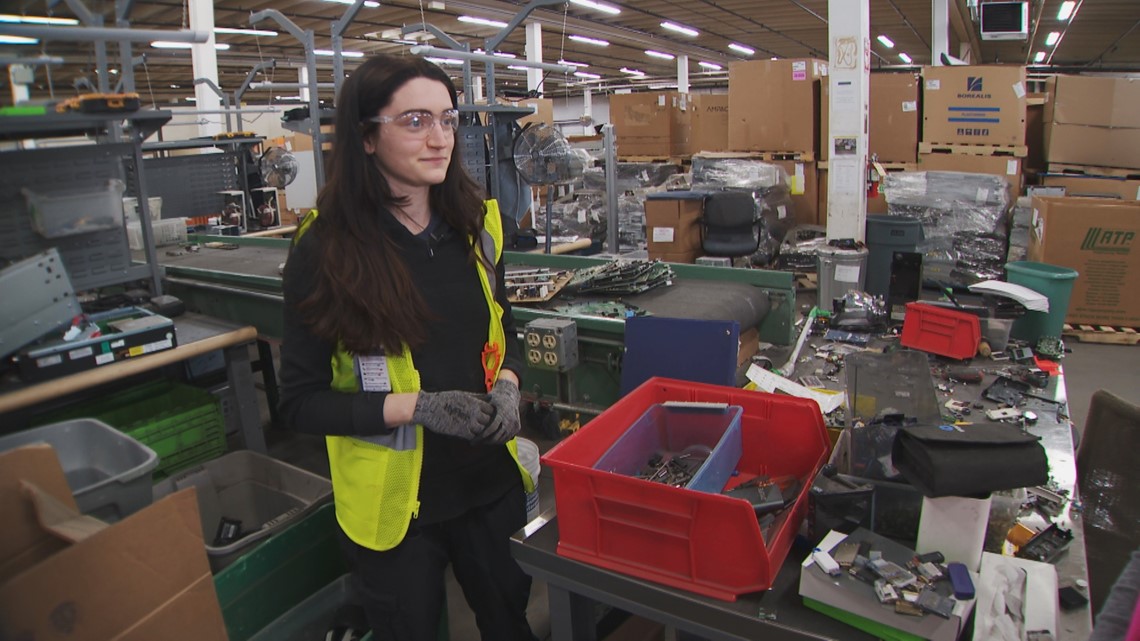
The study used peer-reviewed research, reports and local data on e-waste to look at 62 different elements. At a 100% e-waste recycling rate in Minnesota, the top elements by weight were iron (40.6%), copper (32.2%), tin (9.6%) and aluminum (8.5%). The top e-waste by value included palladium (53.5%), platinum (36.5%), copper (3.8%) and tin (3.6%).
The study found that the projected job creation — if 100% of e-waste in Minnesota were to be captured — is 1,738 direct jobs and a total of 3,345 new jobs.
"These are jobs that they won't go away once the mine closes because the mine isn't going to close. Our electronics waste stream is growing every year," Jensen said.
"We're always looking for new opportunities for jobs in northern Minnesota and e-waste, in terms of handling the disassembly, the shredding, the processing beyond that is an opportunity for jobs that could be located anywhere and some of those jobs right now are going out of state," Steva said.
Currently, Repowered ships recyclables out of state to get shredded and overseas to get smelted.
"It still is a cheaper and more environmentally-friendly process but there are huge improvements that we should be looking forward to in the future," Jensen said.
Riffel added, "Our figures are for the absolute potential — the value if we collected all of it and were able to process all of it. We have no idea what it will cost to process all of it because we don't do that here."
The group pointed to new, more environmentally-friendly options to recover metals that are popping up in other countries, with Steva saying, "We feel Minnesota can become a leader in this space in terms of developing the technology processes and legislation."
One change the group would like to see involves updating Minnesota's 2007 Electronics Recycling Act. While technology has changed, legislation has not.
"There's some kind of antiquated language in there. They define covered electronics with kind of set groups of types of electronics including things like fax machines. Well as those stop appearing in the waste stream, it doesn't mean our waste stream is declining. It just means fax machines are popping up less in our waste stream," Jensen explained.

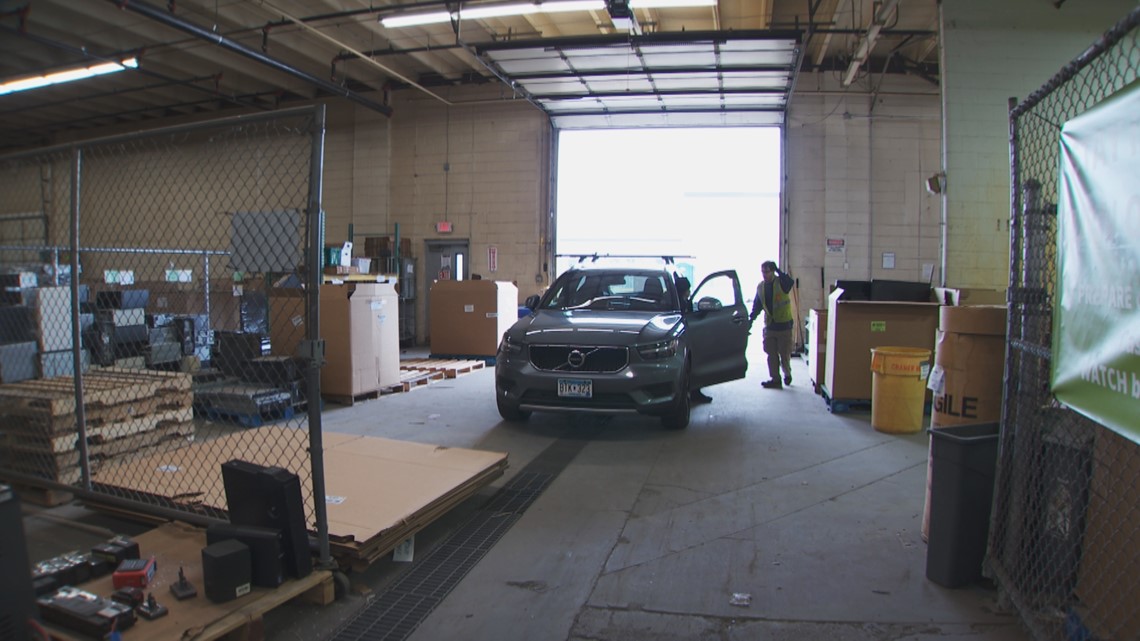
Last year, Ramsey County started a partnership with Repowered to offer free recycling to the county's residents. That means Ramsey County residents can drop off cell phones, televisions, computers and devices that connect to them for free. That's compared to Repowered's typical drop-off pricing which can cost up to $125 for recycling TVs and monitors depending on the size. The program is funded through a trash bill fee.
Regardless of where someone lives, Repowered takes computers and cell/smartphones for free.
The group wants to update the law to provide free, local dropoffs throughout the state. To fund it, there would be a 3% "eco-fee" on electronics.
"Research shows that if you have free and easily accessible drop-off points, people will bring electronic recycling... if you provide them with the information they need to do that," Riffel said.
For those concerned about data privacy, Jensen recommends looking at an organization's certification. Repowered is certified by the National Association for Information Destruction, the highest standard for information destruction in the industry. They also have R2 certification. All data gets destroyed before leaving the facility.

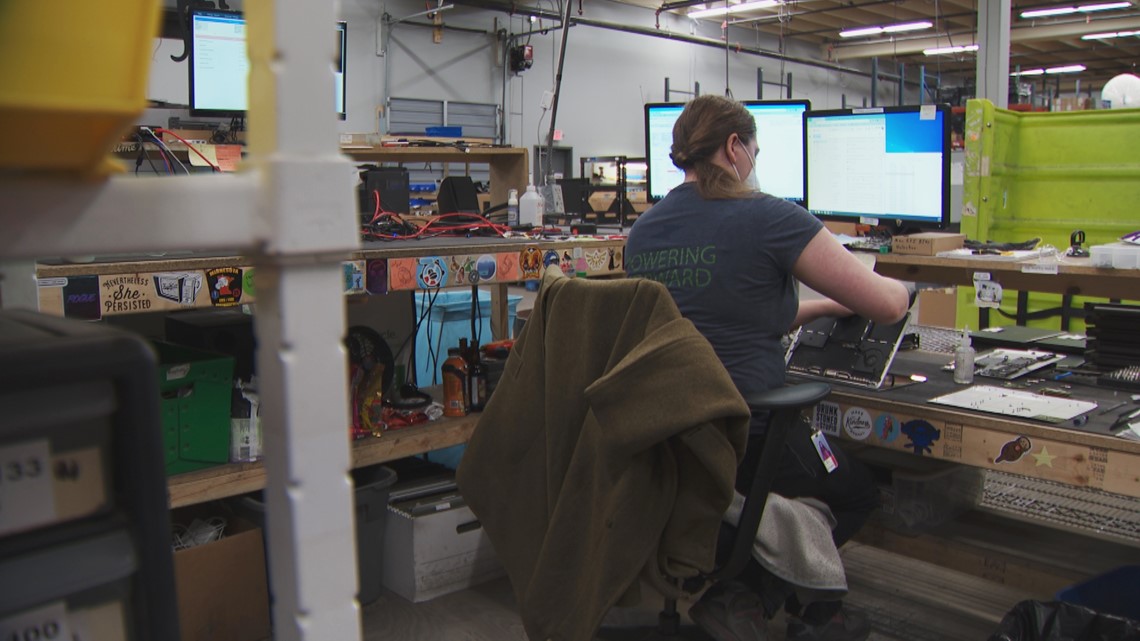
Of the three million pounds of electronics Repowered collects each year, about 10% of it gets re-used. Employees refurbish electronics, including phones, laptops and tablets to then sell at a lower price point at their brick-and-mortar stores in Golden Valley and St. Paul.
"Individuals can make a difference by their choices, their consumption choices," Jensen said.
Riffel said they hope to use this pilot study as a jumping-off point for more research into how Minnesota can be a leader in the e-waste recycling field.
Jensen said their pilot study made her excited about the future, adding, "What can we do with this? What can Minnesota look like if we were recycling 100% of our electronics and extracting all those metals to be reused instead of needing to mine for them?"
WATCH MORE ON KARE 11+
Download the free KARE 11+ app for Roku, Fire TV, Apple TV and other smart TV platforms to watch more from KARE 11 anytime! The KARE 11+ app includes live streams of all of KARE 11's newscasts. You'll also find on-demand replays of newscasts; the latest from KARE 11 Investigates, Breaking the News and the Land of 10,000 Stories; exclusive programs like Verify and HeartThreads; and Minnesota sports talk from our partners at Locked On Minnesota.
- Add KARE 11+ on Roku here or by searching for KARE 11 in the Roku Channel Store.
- Add KARE 11+ on Fire TV here or by searching for KARE 11 in the Amazon App Store.
- Learn more about the KARE 11+ app for Apple TV in the Apple App Store.
- Learn more about KARE 11+ here.
Watch more local news:
Watch the latest local news from the Twin Cities and across Minnesota in our YouTube playlist:

